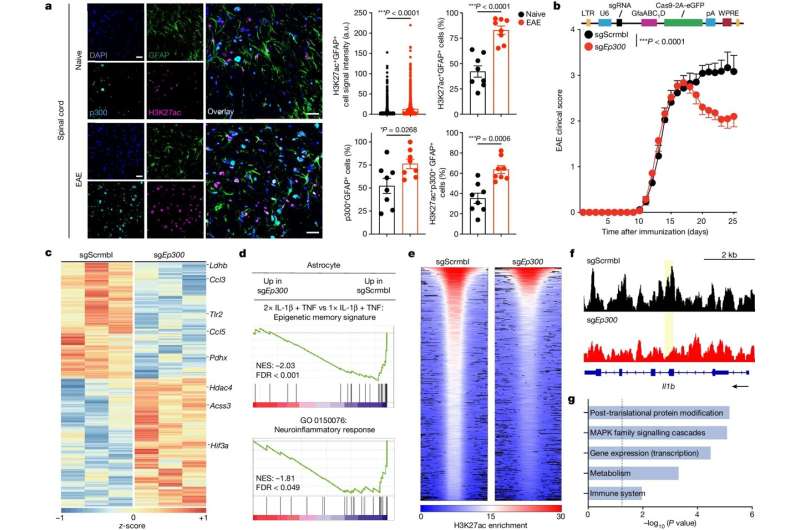This article has been reviewed according to Science X's editorial process and policies. Editors have highlighted the following attributes while ensuring the content's credibility:
fact-checked
trusted source
proofread
Study finds non-immune brain cells can acquire immune memory, may drive CNS pathologies like multiple sclerosis

Immunological memory—the ability to respond to a previously encountered antigen or foreign substance with greater speed and intensity on re-exposure is a hallmark of adaptive immunity.
Innate immune cells also develop metabolic and epigenetic memories that boost their responses, but it was previously unknown if non-immune cells like astrocytes, which interact with immune cells and contribute to inflammation in the central nervous system (CNS), acquire aspects of immune memory of encountering immune stimuli.
Investigators at Brigham and Women's Hospital, a founding member of the Mass General Brigham health care system, have demonstrated for the first time that astrocytes, non-immune cells, can acquire a memory of their previous interactions with the immune system, with important implications for our understanding of tissue inflammation.
The study found that astrocytes can remember previous interactions with immune cells and acquire faster and stronger pro-inflammatory responses upon subsequent re-challenge with immune stimuli. These findings resemble classic descriptions of immune memory in immune cells. Hence, the investigators have termed it astrocyte immune memory to differentiate it from the described roles of astrocytes in cognitive memory.
Considering the longevity of astrocytes and their multiple contributions to CNS pathology, the authors suggest that astrocyte immune memory might be a possible mechanism behind chronic neurologic disorders.
In a series of in vivo and in vitro studies, the investigators established that astrocyte immune memory is driven by an epigenetic program driven by p300 and ATP-citrate lyase (ACLY)—enzymes that help increase gene activity. The team found that astrocytes expressing p300 and ACLY were upregulated in mouse models of multiple sclerosis (MS), and that astrocyte-specific inactivation of these genes suppressed CNS inflammation and disease progression.
The researchers also observed astrocyte memory in vitro in human cells and detected elevated levels of ACLY+p300+astrocytes in chronic MS human patient samples, indicating a potential role of astrocyte memory in disease pathology.
"Our work reveals that astrocytes, non-immune cells, can develop aspects of immune memory," said corresponding author Francisco Quintana, Ph.D., of the Department of Neurology.
"We also show that epigenetic astrocyte memory promotes CNS pathology in autoimmune inflammation. These findings highlight important mechanisms relevant to neurologic disorders like MS and could guide the development of novel therapeutic interventions that target ACLY+p300+ memory astrocytes to reduce inflammation."
The work is published in the journal Nature.
More information: Francisco Quintana, Disease-associated astrocyte epigenetic memory promotes CNS pathology, Nature (2024). DOI: 10.1038/s41586-024-07187-5. www.nature.com/articles/s41586-024-07187-5

















